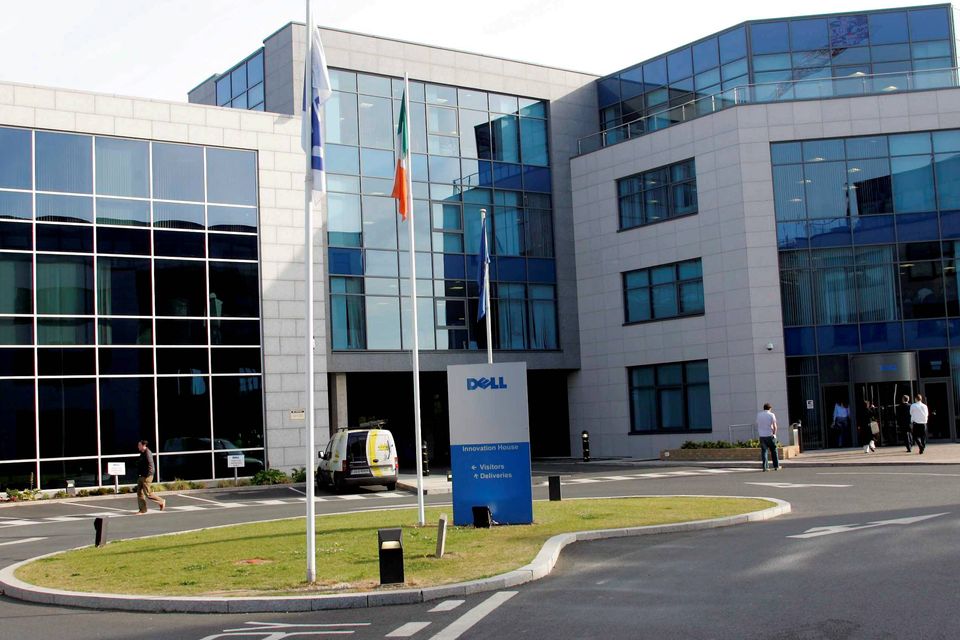How Dell's Euro boss banished the beige boxmaker brand
Major employer: the Dell computer offices at Cherrywood, south Dublin
There are not too many Irish businessmen who need to worry about geo-political flashpoints in Gaza, Iraq or the Ukraine. But Dell's Aongus Hegarty is one of them. As Dell's top executive in Europe, the Middle east and Africa, Hegarty sees ramifications from conflicts that many of us might miss.
"It's not so much the conflicts themselves, which can be quite local," he says. "The concern is more around the implications for wider economies from these events. Sanctions is one challenge. But there are lost opportunities from areas like Iraq and Libya. Those economies were beginning to grow in infrastructure and technology. But the political situation there has slowed down opportunities for further growth and development across that region."
It is not just economic and political instability across a region of almost one billion people that Hegarty now tracks.
The Limerick man is at the cutting edge of Dell's general transformation away from being a 'PC company' to a technology solutions' company. That might sound like jargon, but Dell sees it as a move from being a beige box maker to an all-service provider.
In other words, it would prefer to be IBM than Asus.
"We're very proud of our hardware," says Hegarty. "We started off in that space 30 years ago and we continue to innovate. We have PCs, thin clients, tablets, servers, storage and other strengths. But we're broadening the category.
"We now have genuinely strong software, security, systems management and data analysis products too. It's happened quickly because it needed to. The evolution of this business is very fast."
Dell remains an employment behemoth in Ireland. It employs between 2,300 and 2,400 people in Dublin, Cork and Limerick.
While just over half of these are in Dublin, arguably Dell's most important development work is happening in its Limerick 'centre of excellence' facility. There, much of what the company is creating in Ireland has flown largely under the radar. It has developed some advanced technology for specific industries.
For example, it now works with security agencies to recover criminal information from devices without compromising evidentiary or legal rules relating to the device's integrity. It also has some advanced systems designed to work in specialist industries such as oil and gas.
"Ireland has always been very important to Dell," says Hegarty. "And across a whole range of measurements, Dell is now the number one technology company in Ireland by volume, value and units."
The company has also taken some innovative steps in the last year to gain an advantage over some rivals in selling the technology they make. One of these was in setting up its own €300m bank, with an official Irish banking licence.
"One of the things we've seen across Europe is that is that working capital and credit is still an issue," says Hegarty. "So we decided to unlock greater access to capital projects by offering finance directly. We had been providing it through a partner. But by having it ourselves, we can design services to suit customer needs much better.
"It's been a long term project and there's still some investment to go there. But we're now achieving double digit growth. And all sizes of companies are are availing of the financial services we offer, with most using it as a complete end-to-end solution."
Dell has gone about hiring 200 people to complete this vision of itself as a one-stop-shop vendor and financial provider. It's something that may have been more complicated to execute had it not retreated from being a publicly traded firm to becoming a private company, with no speculative traders betting for or against its strategies.
"As a private company, we don't have a stock market or 90 day deadlines to worry about," says Hegarty.
"We've got one shareholder [Michael Dell] who happens to be the founder and CEO. That allows us to take a medium and long term view of things and to adjust our strategy accordingly."
It also allows Dell not to hang its hat too much on whatever happens to be flavour of the month. While this year it's 'wearables' and the 'internet of things', last year it was tablets. While the tablet PC market has hit something of a wall in sales, Hegarty still sees some growth in enterprise usage.
"I think consumers are refreshing their laptops more than their tablets at the moment," he says. "But in business, there is continued growth in the tablet space as companies become more confident in their own IT needs."
Although Dell has had an industrial presence in Ireland for 24 years, the basic makeup of the staff it employs here has changed radically in the last five years. Where once it concentrated on assembly and customer support, it now incorporates far more engineering and design. And it is also increasing its headcount here.
"Ireland is still Dell's largest employee base anywhere in Europe, the Middle East or Africa," says Hegarty. "It's evolved very well. Facilities like Dell Financial Services or our software centre are very significant investments we've made over the last few years. And the breadth of skillsets we have in Ireland insulates us from some of the changes that are occurring. I'd be very confident about the importance Ireland plays in Dell's future."
From his position as the regional head of a major industrial corporation, Hegarty also sees transitions in Ireland's overall economic performance.
"Looking at Ireland in general, the most recent data is positive, from our company's perspective," he says.
"Ireland's a very open economy, so when other economies are doing well, we do well. But it's early days. Some economies are picking up but economic growth has slowed a little in the euro economy. But Ireland has done well. In the last five years, it has attracted a lot of investment.
"That said, we need a sustained recovery, that will absolutely ensure that Irish unemployment will come down from the 11pc it's at right now. I would continue to be very positive."
Join the Irish Independent WhatsApp channel
Stay up to date with all the latest news















